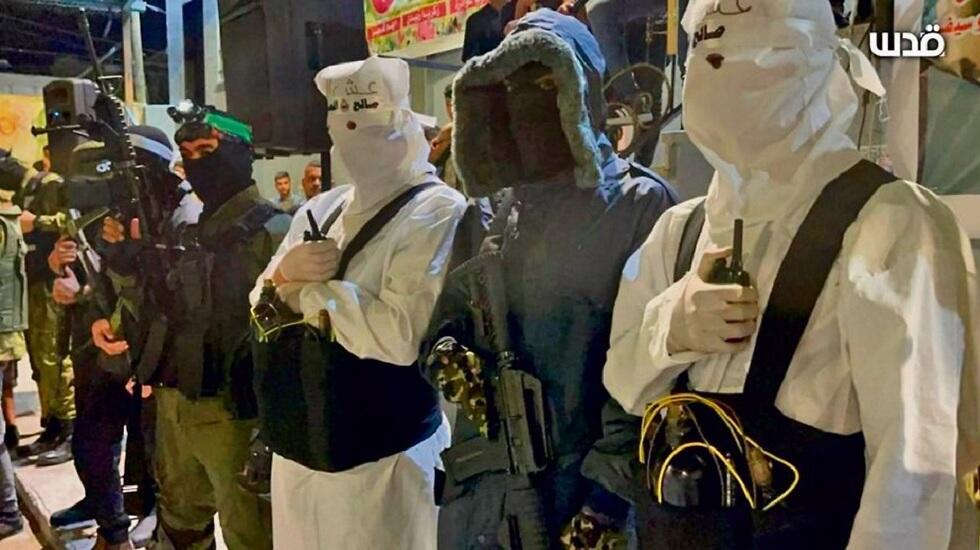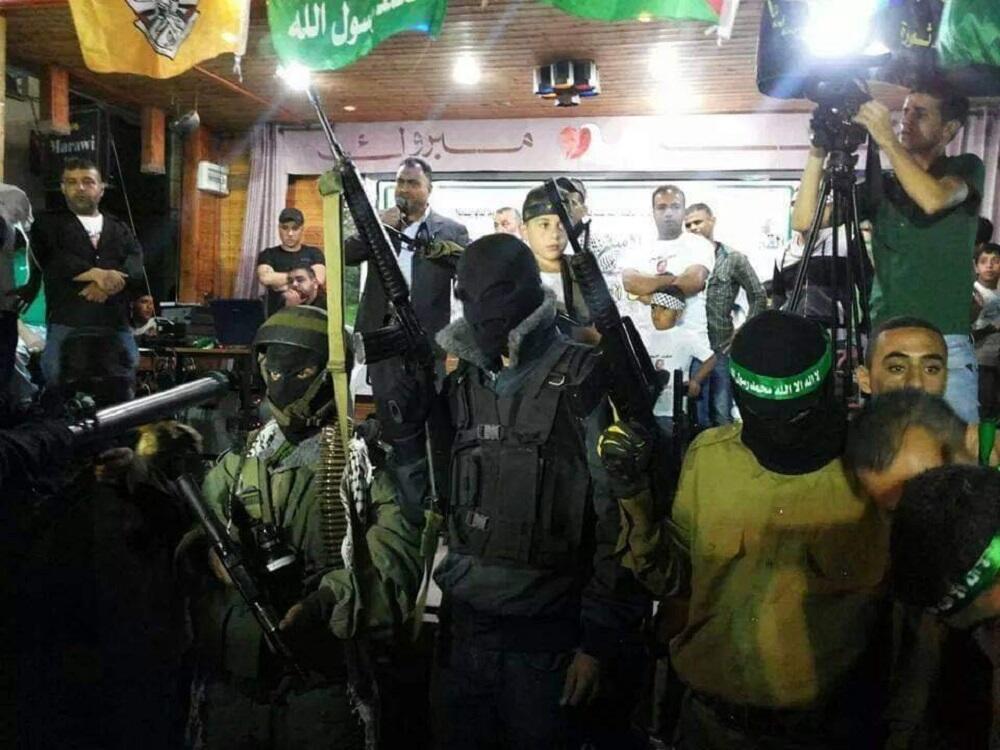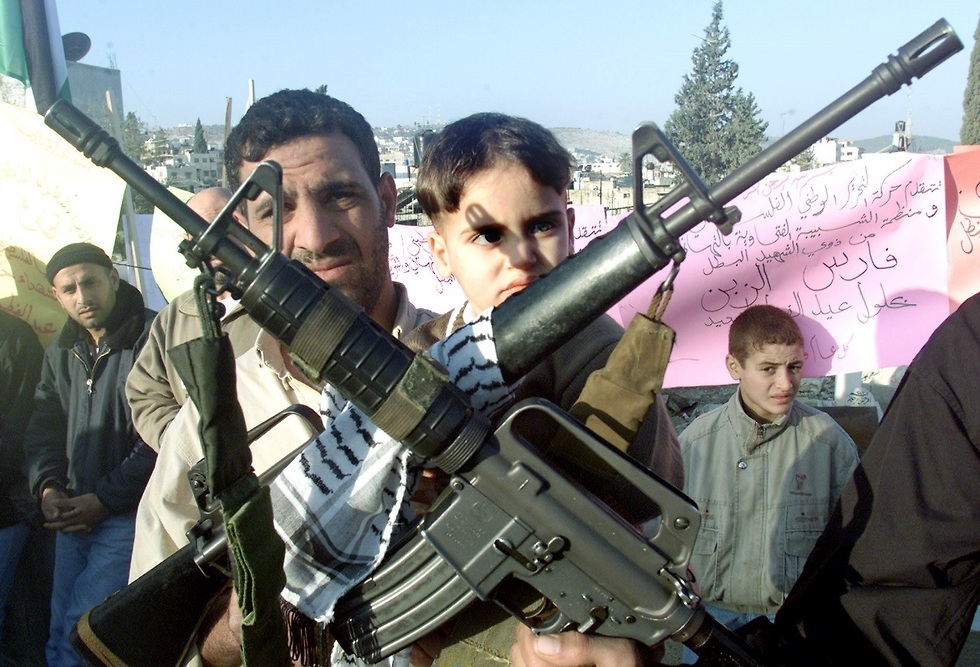As the situation in the West Bank city of Jenin is heating up, two weeks ago a group of armed men gathered at the refugee camp for another showcase event, making threats towards Israel.
These types of "shows" occur in the city fairly regularly, but this time there was something different. Among the rioters stood several Palestinian men wearing white robes and what appeared to be fake suicide vests. This image was common in the West Bank during the Second Intifada, but has since disappeared — until now.
Back in the day, the men wearing white robes were suicide bombers who intended to blow themselves up in Israel. The vests from two weeks ago might have not been filled with explosives, but the message was loud and clear, the threat of suicide bombings is back on the table.
"We warn the Zionist enemy, don't try to enter the refugee camp because we are ready for you," said one of the masked gunmen.
Jenin camp was one of the biggest symbols of the Second Intifada. During Operation Defensive Shield back in 2002, at least 23 IDF soldiers, among them 13 reservists, were killed in the city in just one day, while the Palestinians claimed there was a massacre of the local population. The presence of militants there has diminished over the years, but the legacy of the intifada and what it meant for the city rests with the Palestinian public. The incidents that have taken place in Jenin over the past six months make it seem as though the city went back in time to the early 2000s.
At the end of the Second Intifada, the armed men in Jenin's refugee camp felt they were getting pushed aside. The Palestinian economy began to grow, and the regime shifted from militant Yaser Arafat to more diplomatic Mahmoud Abbas. As a result, government institutions were rebuilt, and the armed factions that were favored by the public were forgotten.
5 View gallery
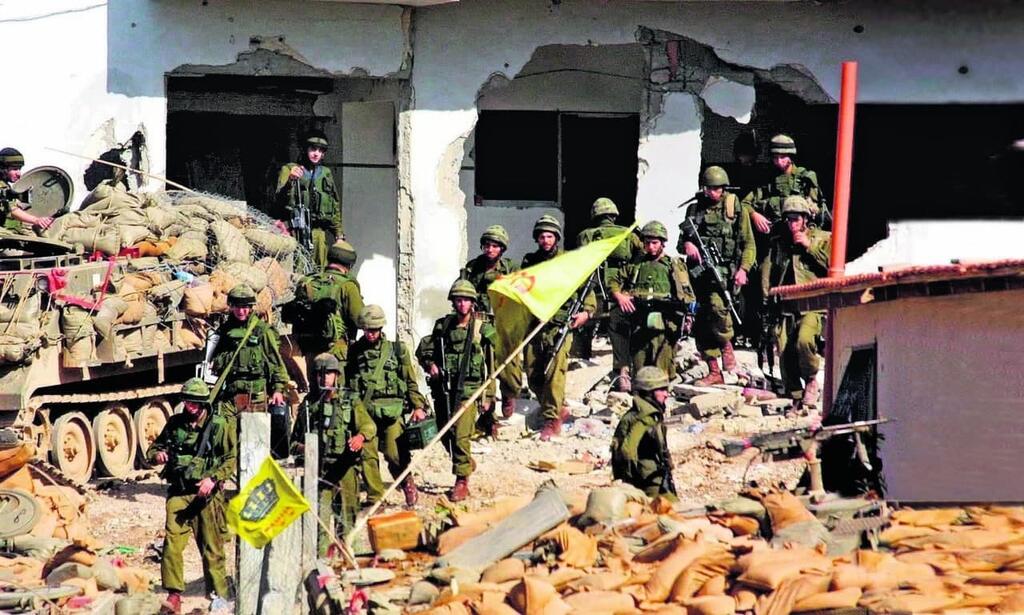

IDF forces in Jenin refugee camp during Operation Defensive Shield, 2002
(Photo: Atta Awisat)
Some of them joined the Palestinian security forces, but the majority stayed in the city, frustrated and embittered. The weapons they had amassed were used mostly for criminal activity, and each time the PA entered the camp, it was accompanied by resistance and a mutual exchange of fire.
Jenin reappeared in the headline last year headlines due to COVID and since has not left. At the beginning of the pandemic, the PA struggled to enforce quarantines and restrictions on the public. So, in order to solve the issue, the PA asked for the help of Fatah's militant faction in various districts, including Jenin. The IDF, for its part, made fewer arrests at the time, and those two factors made it easy for the armed factions in Jenin to raise their head above water.
Later, Abbas declared the election to the Palestinian parliament for the first time in many years and Hamas immediately announced their list of candidates who will take on Fatah. Israel didn't want to be seen as though they support Fatah, so arrests of Hamas and Jihad operatives were reduced.
What does all this have to do with the refugee camp? Islamic Jihad has power and influence in the area and Jenin is the organization's main source of power in the West Bank. Reducing arrests due to the coronavirus pandemic and the elections helped them regroup and expand their activities.
For operational reasons, Israel also decided to reduce the number of forces that were stationed near the area. As a result, weapon smuggling from Israel to the West Bank increased, and Jenin is now swimming in illegal arms such as M-16, AKs, pistols, roadside bombs and possibly even a few heavy machine guns.
Since the beginning of the COVID-19 pandemic, Israel has closed many border crossings or reduced their activity. The Gilboa checkpoint is the main route to Jenin and is also its biggest economic source. Before the pandemic, every weekend tens of thousands of Israeli Arabs passed through the checkpoint to do some shopping in the city, thanks to which, hundreds of local businesses thrived. The closure of Gilboa was a devastating blow to the merchants, which led to prosperity in the illegal weapons business.
This has emboldened the Islamic Jihad and the organization gained even more power in Jenin. Unlike other areas, inside Jenin's refugee camp terror operatives receive military training on a regular basis. The camp also proclaimed itself to be the focal point of armed resistance in the West Bank, saying that every IDF raid in the city will lead to a military response. So, when the IDF enters the camp, the Israeli soldiers encounter gunfire regularly, and this situation happens only in Jenin.
As opposed to other areas of the West Bank, in Jenin all factions fight side by side, regardless of their organizational belonging. Because to that, they managed to create a joint operations room like the one in the Gaza Strip. And as soon as a report of IDF activity in the camp emerges, the so-called war room sends armed men via WhatsApp or Telegram text messages to confront the Israeli forces. In addition, the operation room has an array of spotters whose job is to photograph, track and identify any suspicious movements in the area, including undercover vehicles.
For the past six months, Israeli forces have been operating in Jenin and nearby areas non-stop. The operations led to arrests of suspected terrorists and about twenty dead, most of them wanted and armed militants, but mostly, the operations created an escalation of tensions in the area.
5 View gallery
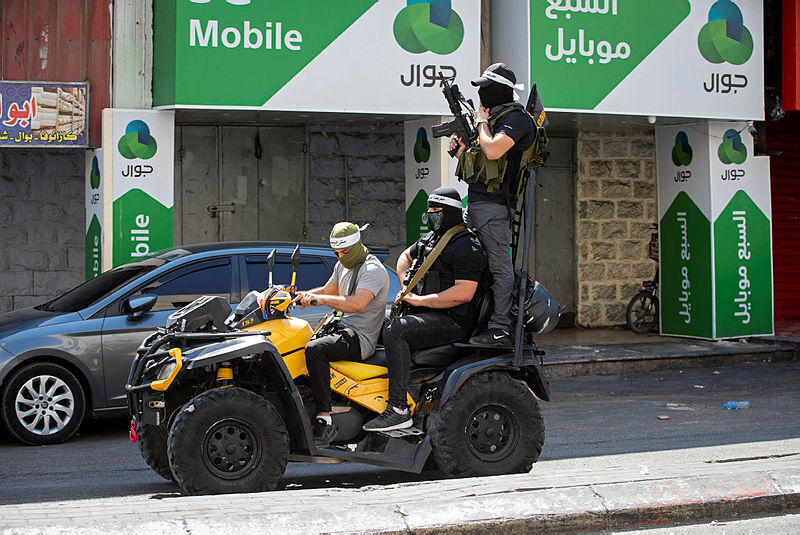

Armed Palestinians driving through streets of Jenin refugee camp on northern West Bank, August 16, 2021
(Photo: AP)
Another phenomenon happening in Jenin is the encouragement of Hamas to turn Islamic Jihad into its subcontractor in the area. In recent months, Hamas has been funding Jihad's military operations, while Jihad used the funds to purchase weapons in order to carry out attacks against Israel.
A source in the camp told us the Islamic Jihad has a price tag for every terrorist attack that it offers to local youth like a menu. "Take a weapon and go shoot IDF forces, if you manage to hit them, you'll get $300, and if you don't, you'll get a consolation fee of $100 for trying," he says.
Before the attack, the young men undergo military training inside the camp area first. It is difficult to see any other solution to the problem Jenin creates for both Israel and the PA. And it seems that the only option is a vast military operation, which will clean the camp from its terrorist activity. Despite various recent publications regarding the possibility of such an operation, currently, there is no intention to do so, due to associated consequences that may destabilize the PA and the relative stability in the West Bank. Such a move could even provoke a response of the Islamic Jihad from the Gaza Strip.
As for now, Israel continues to carry out operations and arrests frequently inside and around the city. And assists in the city's economic activity by opening the crossings leading to the area to encourage Israeli Arabs to visit the city. With the understanding that prosperity and quiet would put pressure on the armed groups.


